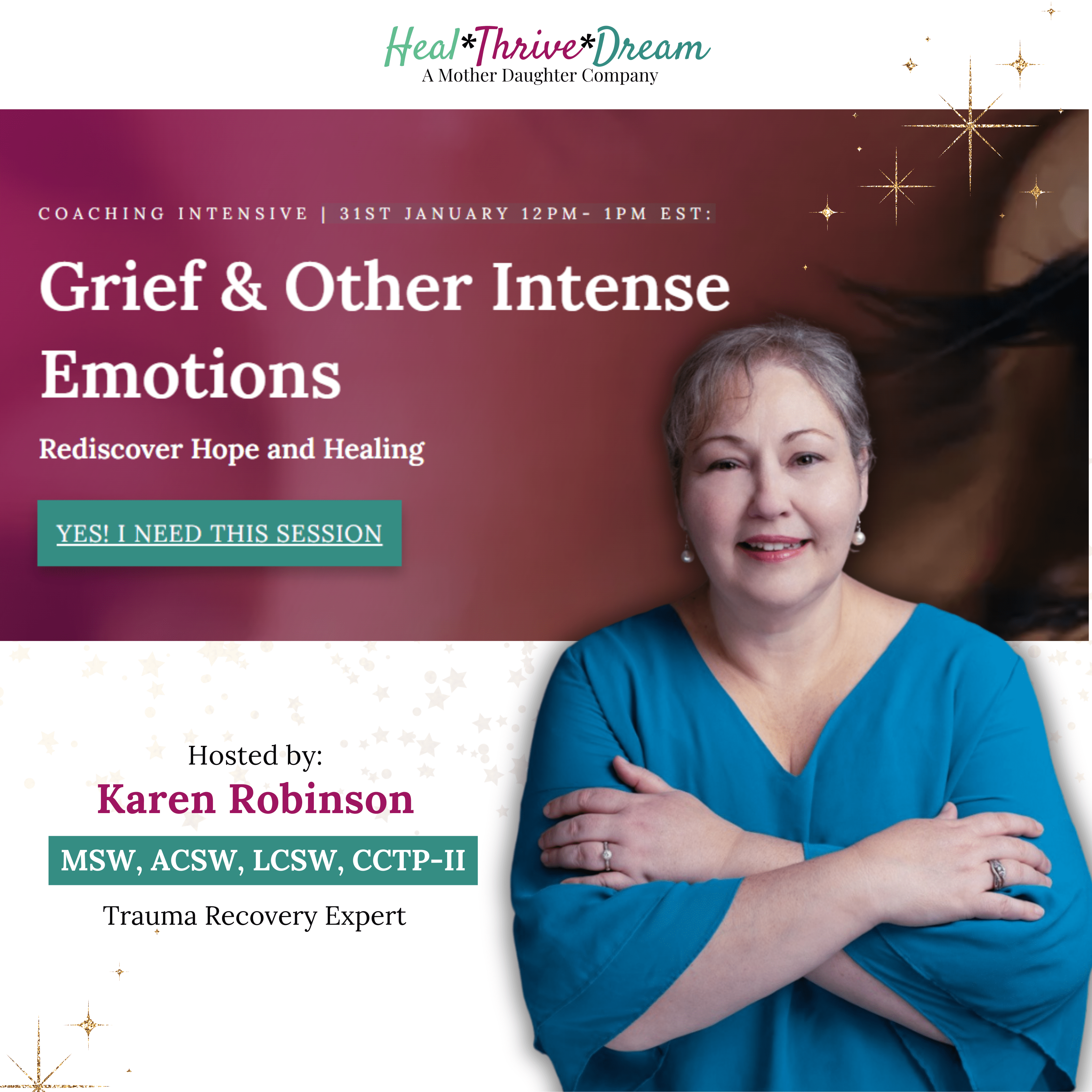Being a survivor of childhood trauma is one reason why grieving gets complicated. It can be complicated for other reasons too. In this post, I will share more about complicated grief, the intense emotions involved, and how hope for healing is possible with the right resources in place.

Sign up now!
Regain control over your emotions and begin the journey towards inner peace and stability.
Complicated Grief: Understanding the Emotions Beyond Traditional Bereavement

Grief is a natural response to loss, a deeply personal journey that varies from one person to another. While many navigate back and forth through the stages of grief identified by Elizabeth Kubler Ross—denial, anger, bargaining, depression, and acceptance—you may find yourself trapped in a prolonged, intense state of mourning that doesn't seem to ease with time. This form of enduring sorrow is known as complicated grief (CG), a condition that goes beyond traditional bereavement, entangling survivors in unresolved emotion and pain.
Unlike typical grief, which gradually lessens in intensity, CG lingers, deeply rooted in the psyche, affecting your ability to function and find joy in life. It's characterized by an ongoing longing for the deceased, intense sorrow and emotional pain, difficulty engaging with life, and a preoccupation with thoughts of your lost loved one.
Distinguishing Features of Complicated Grief
What sets complicated grief apart is not just the duration but the intensity and the impact on your life. You may experience intrusive thoughts or images of the deceased, intense guilt or anger, and a sense of meaninglessness. You might also avoid reminders of the loss, feeling stuck in a past that seems impossible to move beyond.
Intense Emotions
The emotional landscape of complicated grief is complex. It's marked by a profound sense of disconnection—not just from others, but from yourself too. The pain of the loss consumes your identity, often leading to questions of who you are without your loved one. This can result in a deep existential crisis, where the very essence of life and its purpose comes under scrutiny. It is common to feel all of your emotions even more intensely or feel complete numbness at times.
Risk Factors
Certain factors can predispose you to complicated grief. These include the nature of your relationship with the deceased, the circumstances of the death (sudden, traumatic), and your previous experiences with loss or trauma. Additionally, personal factors such as your coping style, resilience, and the presence of your support systems play significant roles in the development and persistence of CG.
Complimentary Coaching Healing Intensive
31st January 2025, 12:00 PM - 1:00 PM EST
Grief and Intense Emotions
Healing is Possible

Healing from complicated grief is a gradual process that involves acknowledging the depth of the loss and actively working through the complex emotions it brings. It's about finding a way to reconcile the desire to hold on to your memory of the deceased with the need to re-engage with your life. Here are some steps on this healing journey:
Seek Professional Help
Due to the nature of complicated grief, you will most likely benefit the most by holistic health, mental health, and spiritual care. A combination of medications, therapy, and working with clergy to work through any moral injuries you may be experiencing will aid your healing process. Therapy, especially forms like cognitive-behavioral therapy (CBT) are tailored for complicated grief. Your triggers, negative or unhealthy thoughts are tracked by you so you can observe how they impact both your emotions and behaviors.
Importance of Connection
Joining support groups where you share similar experiences can foster a sense of community and understanding, providing a safe space to express grief. There are support groups available based on the type of loss experience including: loss of child, survivors of homicides, infant mortality, support post suicides and more. You will know when the time is right to be involved in community support.
A Legacy
Channeling grief into actions that honor the memory of the loved one, such as volunteering, creating art, or starting a charity, can provide a constructive outlet for sorrow and a sense of continuity. I love when scholarships are started in memory of loved ones. It is an honor for the deceased and also empowers a student in need.
Engaging in Self-Care
Engaging in activities that promote physical, spiritual, and emotional well-being—like exercise, meditation, and hobbies—can help restore balance and bring moments of joy. It is okay to cling to any and all moments of joy. You do not deserve to suffer. Your loved one would not want that for you.
Acceptance and Allowance
Setting aside time to acknowledge and express your grief can prevent emotions from building up. This could be through writing, speaking with a loved one about the deceased, or visiting a place that was special to them. You get to decide how you will grieve, when to accept your loss, and how you allow yourself to remember them. It is okay to create your own rules for healing and remembrance.
Your Healing Path
The path through complicated grief is not linear; it meanders, with ups and downs, moments of clarity followed by periods of intense sorrow. Yet, with time, support, and a willingness to face the pain, you can find a way to carry your loss without being overwhelmed by it. This doesn't mean forgetting your loved one or the love you shared, but finding a way to integrate this loss into your life story, allowing you to move forward with hope and peace.
Complicated grief challenges your understanding of bereavement, pushing you to recognize the profound impact loss can have on your life. By acknowledging the depth of these emotions and the need for targeted support, we can all better assist those struggling with CG to navigate their way through the darkness, towards a place of healing and peace. Remember, grief is a testament to love, and navigating its complexities is part of our human experience, one that, with time and support, can lead to a renewed sense of purpose and connection.


